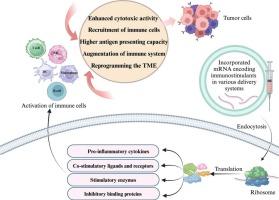基于 mRNA 的癌症疫苗编码免疫刺激剂及其递送策略的最新进展。
IF 10.5
1区 医学
Q1 CHEMISTRY, MULTIDISCIPLINARY
引用次数: 0
摘要
由于传统癌症疗法的耐药性、复发率和不良反应率较高,因此有必要开发更有效的治疗方法。mRNA 癌症疫苗作为一个新兴的免疫疗法领域,最近引起了人们的特别关注,在编码肿瘤相关抗原、肿瘤特异性抗原和免疫刺激因子的 mRNA 中,后者的研究相对较少。这些免疫刺激mRNA编码一系列蛋白质,包括刺激性配体、受体、酶、促炎细胞因子和抑制性结合蛋白,它们共同增强了宿主免疫系统对抗癌细胞的能力。在这篇综述中,我们旨在全面介绍基于 mRNA 的编码免疫刺激剂的癌症疫苗,包括其现状、作用机制、采用的递送策略以及临床前和临床研究的最新进展。此外,还讨论了潜在的挑战、策略和未来展望。本文章由计算机程序翻译,如有差异,请以英文原文为准。

Recent advances in mRNA-based cancer vaccines encoding immunostimulants and their delivery strategies
The high prevalence of drug resistance, relapse, and unfavorable response rate of conventional cancer therapies necessitate the development of more efficient treatment modalities. Immunotherapy represents a novel therapeutic approach to cancer treatment in which the immune system's potential is harnessed to recognize and eliminate tumor cells. mRNA cancer vaccines, as a burgeoning field of immunotherapy, have recently drawn particular attention, and among mRNAs encoding tumor-associated antigens, tumor-specific antigens, and immune stimulatory factors, the latter has been relatively less explored. These immunostimulatory mRNAs encode a range of proteins, including stimulatory ligands, receptors, enzymes, pro-inflammatory cytokines, and inhibitory binding proteins, which collectively augment the host immune system's ability against cancerous cells. In this review, we aimed to provide a comprehensive account of mRNA-based cancer vaccines encoding immune stimulants, encompassing their current status, mechanisms of action, delivery strategies employed, as well as recent advances in preclinical and clinical studies. The potential challenges, strategies and future perspectives have also been discussed.
求助全文
通过发布文献求助,成功后即可免费获取论文全文。
去求助
来源期刊

Journal of Controlled Release
医学-化学综合
CiteScore
18.50
自引率
5.60%
发文量
700
审稿时长
39 days
期刊介绍:
The Journal of Controlled Release (JCR) proudly serves as the Official Journal of the Controlled Release Society and the Japan Society of Drug Delivery System.
Dedicated to the broad field of delivery science and technology, JCR publishes high-quality research articles covering drug delivery systems and all facets of formulations. This includes the physicochemical and biological properties of drugs, design and characterization of dosage forms, release mechanisms, in vivo testing, and formulation research and development across pharmaceutical, diagnostic, agricultural, environmental, cosmetic, and food industries.
Priority is given to manuscripts that contribute to the fundamental understanding of principles or demonstrate the advantages of novel technologies in terms of safety and efficacy over current clinical standards. JCR strives to be a leading platform for advancements in delivery science and technology.
 求助内容:
求助内容: 应助结果提醒方式:
应助结果提醒方式:


